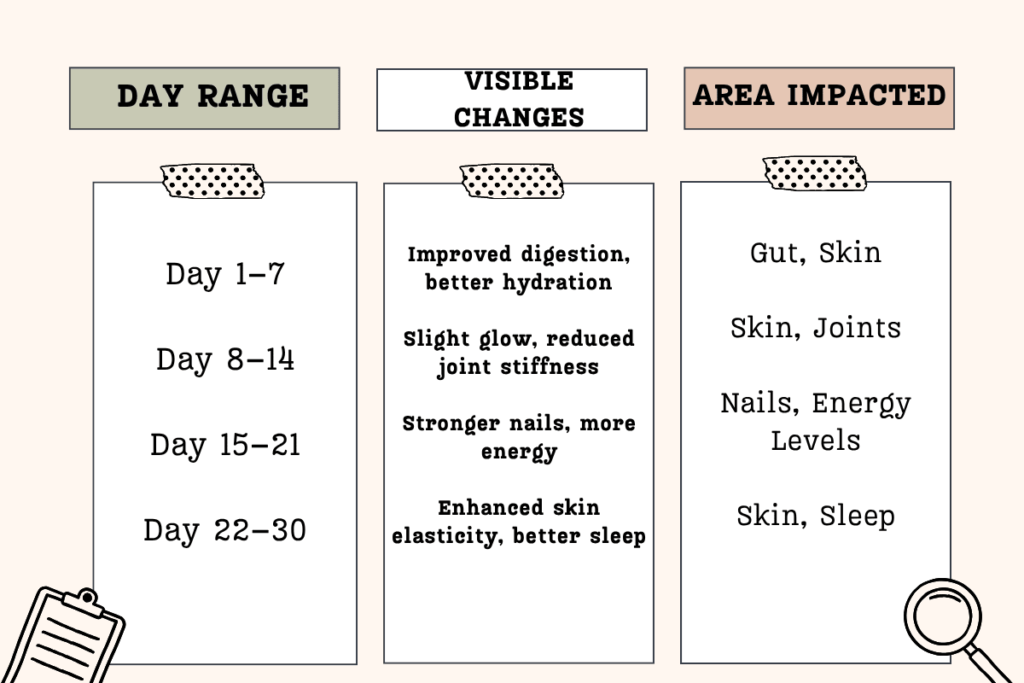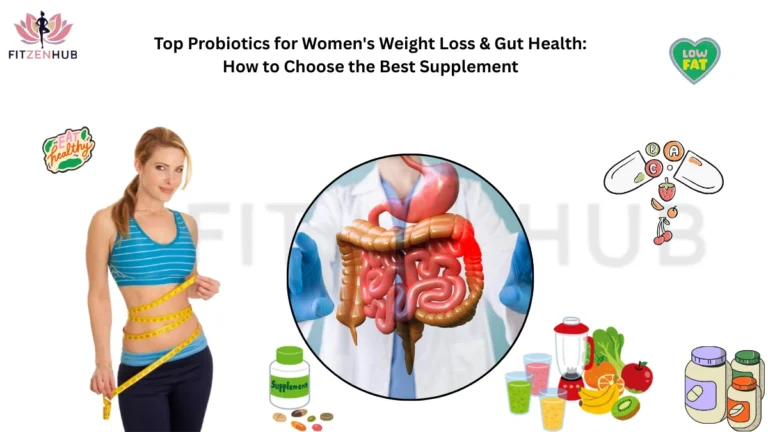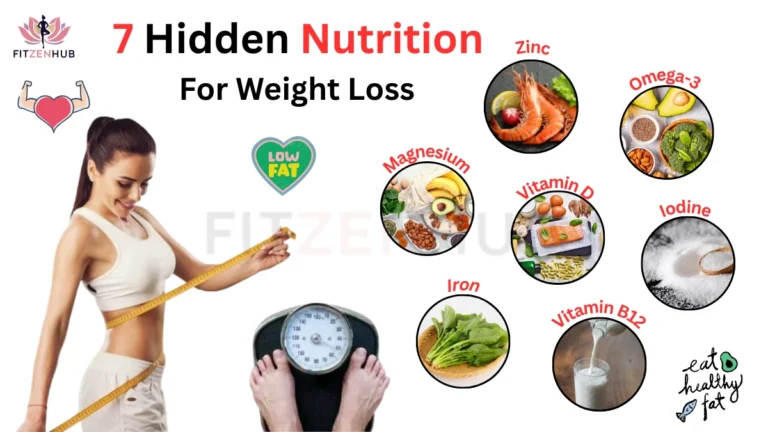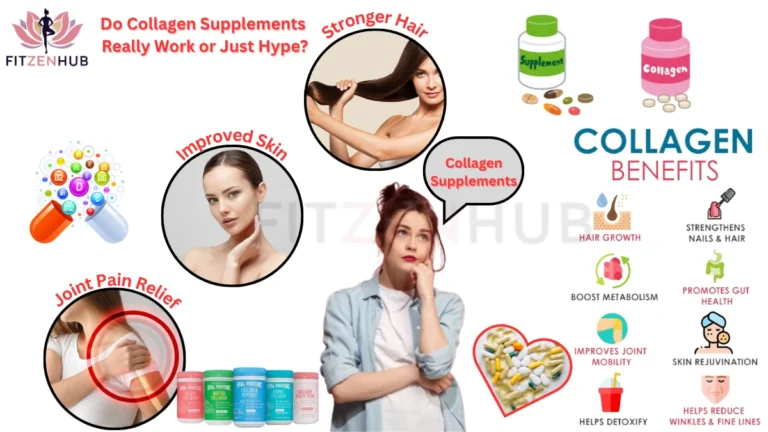Do collagen supplements actually work for women over 30? Discover the science-backed truth about collagen for skin, joints, and graceful aging — and whether you should add it to your daily routine.
Introduction: Why Every Woman Is Suddenly Talking About Collagen
Collagen is everywhere — powders, pills, gummies, and even in your morning coffee. Women across the U.S. are swearing by it for glowing skin, joint support, and anti-aging benefits. But is it hype or is it real?
Let’s break down what science says, what actually happens in your body, and whether investing in collagen is truly worth it.
🧠 What Exactly Is Collagen? And Why Should Women Care?
Collagen is the most abundant protein in your body, forming the building blocks of your skin, bones, joints, ligaments, and connective tissues.
But here’s the problem:
After age 25, your natural collagen production starts declining by 1% every year — accelerating even more after 30 and during menopause.
💡 That’s why women start noticing:
Fine lines
Sagging skin
Joint stiffness
Weak nails or thinning hair
🔬 What Collagen Does Inside a Woman’s Body
Body Part Collagen’s Role
Skin Keeps it firm, hydrated, and elastic
Hair & Nails Boosts strength, thickness, and growth
Joints & Ligaments Maintains mobility and reduces stiffness
Gut Lining Supports gut barrier function and digestion
Bones Provides structure and density
Without collagen, your body ages faster, visibly and internally.
🧪 Do Collagen Supplements Actually Work?
What Science Says
Recent research offers some promising findings:
A 2019 meta-analysis in Journal of Drugs in Dermatology found that women taking collagen peptides for 8–12 weeks experienced:
✅ Improved skin hydration
✅ Less visible wrinkles
✅ Increased skin elasticity
Another study in Current Medical Research noted reduced joint pain in women who were active or had early osteoarthritis.
But there’s a catch…
✨ Not all collagen is created equal.

💡 Types of Collagen You Need to Know
There are 28 types of collagen, but Type I, II, and III are the most important for women’s health:
Collagen Type Found In Benefits
Type I – Skin, bones, tendons Anti-aging, skin firming
Type II – Cartilage Joint & mobility support
Type III – Skin, lungs, vascular system Skin elasticity, gut lining
➡️ Marine collagen (Type I) is best for skin.
➡️ Bovine collagen (Types I & III) is great for skin + gut + hair.
➡️ Chicken collagen (Type II) is ideal for joints.
⚠️ Common Myths Women Believe About Collagen
Let’s debunk a few myths:
“I’m too young for collagen.”
Even in your 20s, your natural collagen declines. Prevention > correction.
“All collagen powders are the same.”
Nope. Quality, source, and bioavailability matter a LOT.
“I’ll just eat bone broth instead.”
Great start — but not as concentrated or consistent as a well-formulated supplement.
🔥 How to Choose the Right Collagen Supplement (Especially for Women 30+)
Before buying, check for:
✅ Hydrolyzed Collagen Peptides – easier to absorb
✅ Vitamin C – helps boost collagen synthesis
✅ No fillers or added sugar
✅ Type-specific support – e.g., Type I & III for skin, Type II for joints
✅ Third-party tested for purity
Top-Rated Additions to combine with collagen:
Hyaluronic acid (for skin hydration)
Biotin + Zinc (for hair and nails)
Magnesium (for better muscle recovery)
👀 Does Collagen Help with Weight Loss or Hormonal Balance?
Not directly — but it can indirectly help by:
Supporting gut health (which affects metabolism)
Improving joint flexibility (which helps you stay active)
Reducing sugar cravings (due to protein content)
Plus, some women on collagen report better sleep and mood, which are key for hormone health.
🧴 Collagen for Beauty vs. Wellness — What’s the Difference?
Goal Recommended Collagen Type Other Support
Skin glow & anti-aging Marine or bovine Type I & III Vitamin C, hyaluronic acid
Joint & bone health Chicken or bovine Type II Magnesium, Vitamin D
Hair & nails Bovine with biotin Silica, Zinc
Gut repair Bovine Type I & III L-glutamine, probiotics
⚡ Pro Tips for Women Starting Collagen Supplements
Take collagen on an empty stomach for best absorption.
Combine with Vitamin C — even just lemon water helps.
Be patient — visible results can take 6–12 weeks.
Consider adding adaptogens like ashwagandha if you want hormone + skin support.
Also Read: Do Women Really Need Collagen?
🔍 Real Talk: Is Collagen Worth It for Women?
If you’re 30+, struggling with skin dullness, joint stiffness, or early signs of aging — collagen is one of the best supplements to start with.
It won’t change your life overnight, but when combined with clean eating, hydration, and sleep, it can slow down aging, enhance beauty, and support mobility.
🧠 Do YOU Really Need Collagen?
💬 Curiosity Corner: Did You Know?
By age 50, women can lose up to 30% of their collagen.
That’s why many experience a “sudden aging effect” during perimenopause.
Now imagine starting at 30 and preserving that structure instead of repairing it at 50.
📚 Sources:
- National Institutes of Health (NIH) – Collagen Overview
🔗 https://www.ncbi.nlm.nih.gov/pmc/articles/PMC8824545 - Journal of Cosmetic Dermatology – Oral collagen supplementation improves skin elasticity
🔗 https://onlinelibrary.wiley.com/doi/full/10.1111/jocd.12174 - Harvard Health Publishing – Collagen: What it is and what it does
🔗 https://www.health.harvard.edu/staying-healthy/collagen-what-it-is-and-what-it-does - Healthline – Do Collagen Supplements Work?
🔗 https://www.healthline.com/nutrition/collagen - Journal of Clinical Nutrition – Hydrolyzed collagen & bone metabolism
🔗 https://academic.oup.com/ajcn/article/113/3/664/6040587
❓FAQs: Do Women Really Need Collagen?
Q1. At what age should women start taking collagen?
👉 Ideally after age 25–30, as the body starts producing less collagen around that time.
Q2. How long does it take to see results from collagen supplements?
👉 Typically 4–8 weeks for skin benefits, and 12+ weeks for joint/mobility improvements.
Q3. Are collagen supplements safe?
👉 Yes, most hydrolyzed (type I & III) collagen peptides are safe. Always check for third-party testing and avoid unnecessary additives.
Q4. Can collagen replace a good diet?
👉 No — collagen is a supplement, not a substitute. A balanced diet is still essential.
Q5. What's the best form of collagen for women?
👉 Hydrolyzed peptides (powder or capsule), especially types I & III for skin and hair; type II for joint support.
✅ Conclusion
Collagen supplements are not just another wellness trend — they’re a scientifically backed tool for supporting skin elasticity, joint comfort, hair/nail strength, and gut health, especially for women over 30.
As natural collagen production declines with age, supplementation can fill in the gaps — but results depend on consistency, quality of the product, and lifestyle choices (diet, hydration, sun exposure).
✨ Final Verdict: For women seeking to age gracefully and stay strong from the inside out, collagen supplements are worth considering as part of a holistic wellness routine.







